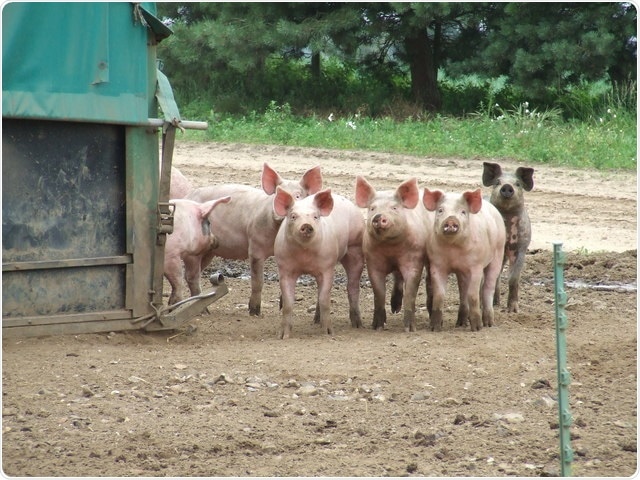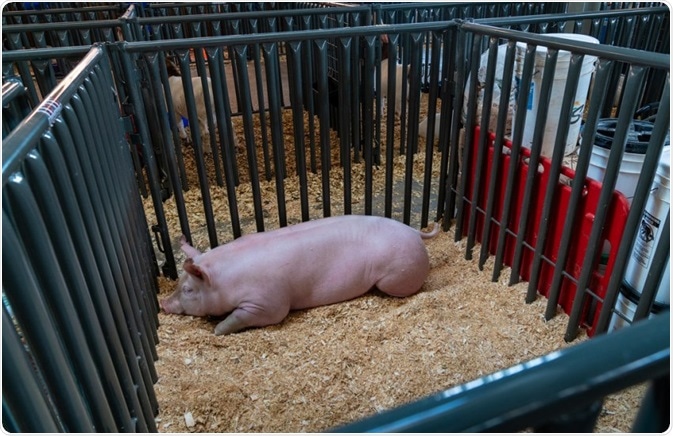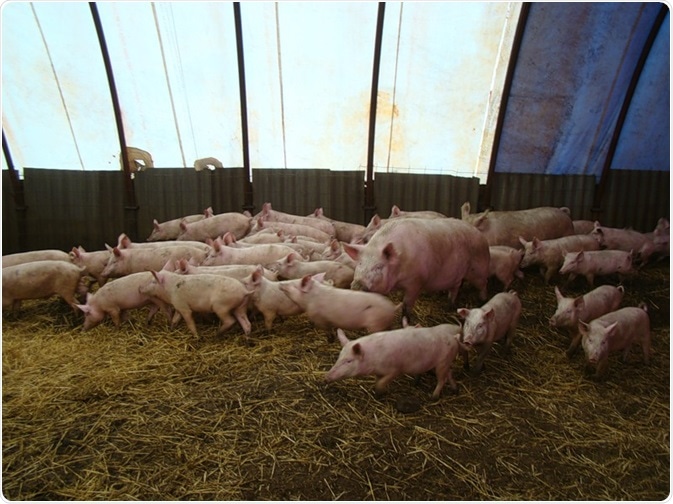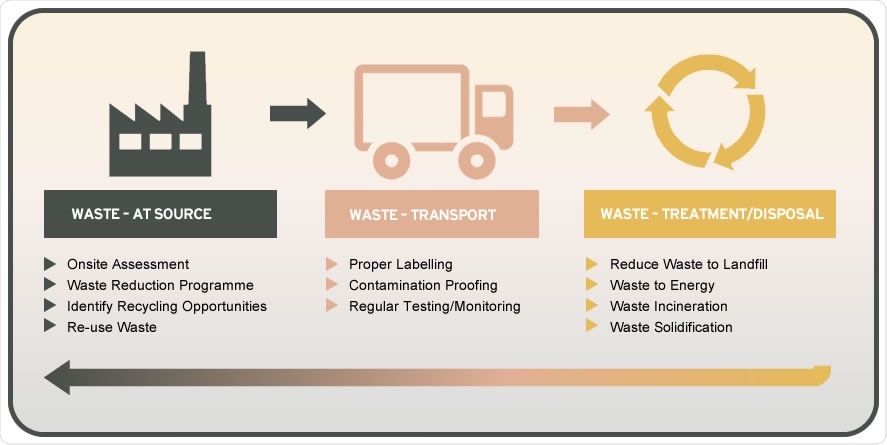The UN’s Food and Agriculture Organization (FAO) has provided information on the number of animals that have been affected by African Swine Fever (ASF) across the Asian continent. Over 5.7 million pigs have been destroyed in Vietnam alone following the outbreak, with millions of other animals having to be culled across other countries, including China, Cambodia, Myanmar, the Philippines, and more.
African Swine Fever: What is it?
African Swine Fever is the name that is given to a highly contagious viral disease, which is found in pigs. In the early 1900s, this disease was first recorded as emerging from East Africa. African Swine Fever causes pigs to suffer an extremely high temperature of up to 41 ⁰C, as well as symptoms of lethargy, visibly blotchy skin and a notable loss of appetite.
Both infected pigs and wild boar affected by the disease can die as a result of it. There is currently no vaccine available to treat the virus. Biosecurity is, therefore, an essential aspect of controlling and preventing the spread of disease.

Image Credit: Inciner8 Limited
How does African Swine Fever Spread?
It is widely considered that African Swine Fever is spread through direct contact. It is thought, though not known, that the initial carriers of the disease were wild boars, additionally considered to be the reason for the virus’ spread. It’s also possible for African Swine Fever to be carried through insects such as ticks.
Concerns have been raised over the fact that meat products have been discovered to house ASF for several months, particularly in processed meat. ASF has been known to survive for several years in frozen carcasses. Across South East Asia, various airports have reported that meat products brought in by travelers have been confiscated and tested positive for African Swine Fever.
In an outbreak of this nature, there is a risk of poor management of the waste products, which can lead to an increased spread of the disease. Together with the risk of water and land becoming infected, this can see the disease emerging in the food and drink that human beings eat. In light of this information, it is essential for any country affected by African Swine Fever to take steps to prevent the spread of disease and effectively destroy any infected materials.

Image Credit: Inciner8 Limited
Below are listed some of the essential steps to follow during an African Swine Fever outbreak:
1. Identification of the Presence of African Swine Fever
Farms and slaughterhouses must inspect their premises in alignment with the national guidelines. If the inspection reveals the presence of African Swine, all production and process must cease for 48 hours. The country in question will issue the exact steps that must be followed by premises which have identified the presence of ASF.
2. Creation of Buffer Zones
The immediate implementation of buffer zones is necessary to separate zones affected by African Swine Fever from disease-free zones. Multiple buffer zones have had to be established in the Republic of Korea by the Ministry of Agriculture, Food and Rural Affairs (MAFRA), even in some designated areas having to use firearms to drive wild boars away from infected areas.
3. Cessation of the Movement of Animals
Even the unaffected animals must not be permitted to move away from infected areas. The Vietnamese government has had to install a directive implementing movement control of pigs as part of a ‘response, control and prevention’ process to stop the spread of African Swine Fever, as Vietnam has a higher cull rate for ASF than any other country.
4. Safe Storage of Waste
Animals that die from African Swine Fever, or are culled as a result of their infection, must be stored safely in an isolated space until their carcasses can be safely disposed of. This same process additionally incorporates any additional waste, equipment, or byproducts which have occurred in the testing for African Swine Fever or handling of the animals.
5. Destruction of Infected Waste
The destruction of all infected and contaminated waste must be facilitated by an incinerator. The clear benefit of incineration, over all others, is the superiority of this method’s bio-security. There is no other waste management process during an outbreak of a disease like African Swine Fever that can provide peace of mind. The preferred and safest solution to such an outbreak is the destruction of fallen livestock at source.
Models can be adjusted due to the high calorific value of pigs and sows to control the amount of fuel being injected, reducing operating costs.
Within just seven days, animal incinerators can be deployed and installed overseas. This is demonstrated by the effective handling of the Ebola outbreak in Guinea, Liberia, and Sierra Leone. These incinerators are fitted with advanced AI technologies and functions for remote support, which permits farm and slaughterhouse workers to pre-programme the combustion settings of the machine to ensure the destruction of all traces of African Swine Fever, without ground personnel needing to worry.
.jpg)
Image Credit: Inciner8 Limited
Recent Updates on African Swine Fever
China
There were 360,000 cases of ASF in 2018 alone. This affected 19 countries in total. In 2018, Romania reported the largest number of reported cases for that year, with over 240,000 confirmed cases of African Swine Fever.
To date, over 1,192,000 pigs have been culled in China since arriving in 2018, across different provinces. This naturally creates a disturbance and major concern for global meat production, given that China is one of the largest producers of pork, with the pork consumption of the average Chinese person being up to 30 kg of pork a year. Given that a large majority of the Chinese population rely on the production and consumption of pork for their income, ASF poses a clear risk to local business and livelihoods.
Vietnam
Since the first outbreak of African Swine Fever was reported on 19th February 2019 in Vietnam, over 5,880,000 pigs have been culled across 63 provinces. African Swine Fever has also reached a number of other countries, including Cambodia, Mongolia, and North Korea in the last year alone. Laos has the most recent reported outbreaks of African Swine Fever: recent reports reveal that 15 out of the 18 provinces have continuously reported outbreaks of ASF.

Image Credit: Inciner8 Limited
For more information on incinerators, speak to an Inciner8 expert today.
References and Further Reading
About Inciner8 Limited

Inciner8 are a globally respected manufacturing organisation offering a range of Incinerators for all applications in the waste management industry, our products are specifically designed with clean air incineration at the forefront of our product development for Medical, Animal by product and General Municipal waste streams.
After many years in the industry with a track record second to none we have become the company that existing and new clients from around the world come to for their incineration solutions
On top of supplying a range of standard models we have developed a bespoke service for specialist markets and requirements thus ensuring we cater for the needs of this growing industry.
Environmental awareness is always a factor in waste management, inciner8 realise the importance of this and continue to demonstrate full commitment in striving to understand and deliver solutions based on individual country regulations and standards, this has been recently enhanced by our range of products specifically launched to provide an extensive range of pollution control systems and heat recovery options.
Inciner8 - Corporate Intro
We are very proud of our company and Brand, our continued focus is to ensure we enhance that position on a global basis with new product development, listening to our clients as part of that process and communicating consistently in every aspect of our daily activity to keep our valued clients abreast of market changes and future developments from Inciner8.
Being a global leader comes with great responsibility, we value feedback as we continue daily to educate our people to ensure they give the most authoritive and educational information to our clients, which is why we employ highly skilled technicians and thermal treatment experts to support all of our client requirements in the decision making process in sourcing environmentally friendly quality products from Inciner8.

Sponsored Content Policy: News-Medical.net publishes articles and related content that may be derived from sources where we have existing commercial relationships, provided such content adds value to the core editorial ethos of News-Medical.Net which is to educate and inform site visitors interested in medical research, science, medical devices and treatments.